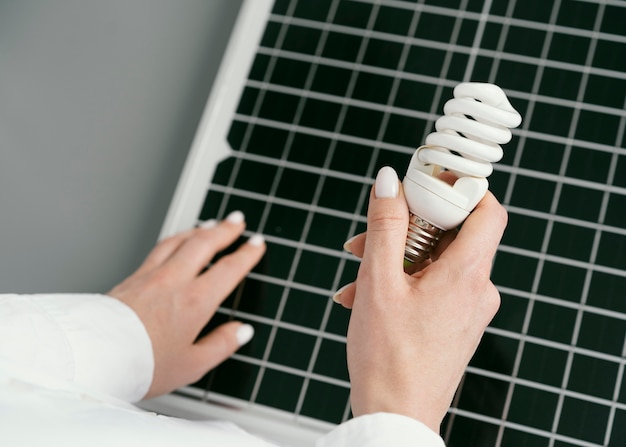

Solar energy is the most abundant source of renewable energy on Earth.
The energy from the sun is enough to power the entire planet for a year in just one hour.
Solar panels can be installed on both residential and commercial buildings to generate electricity.
Solar energy reduces greenhouse gas emissions, helping to combat climate change.
The sun is expected to shine for another 5 billion years, ensuring a long-term renewable energy source.
Solar energy can be stored in batteries for use during cloudy or nighttime periods.
Solar panels can be mounted on tracking systems to maximize their exposure to sunlight throughout the day.
Solar energy can be harnessed even on cloudy or overcast days, although at a reduced efficiency.
The cost of solar panels has decreased by over 70% in the last decade.
Solar energy can be used directly as heat, without the need for conversion to electricity.
Solar power is a decentralised energy source, reducing the need for long-distance electricity transmission.
Solar energy can be used to power transportation, such as electric cars and buses.
The first solar-powered watches were introduced in the 1970s.
Solar energy is a quiet and non-polluting energy source.
Solar panels require very little maintenance, with a typical lifespan of 25-30 years.
Solar power plants can be built in remote areas without access to a power grid.
Solar energy is being used to power satellites and spacecraft in outer space.
Solar panels can be easily added to existing structures, making it a versatile energy source.
The largest solar power plant in the world is located in Tengger Desert, China.
Solar energy is used for water heating in many households and swimming pools.
The first residential solar panel installation took place in 1973 in the United States.
Solar energy can help to reduce the dependence on fossil fuels and imported energy.
Solar power is used in many developing countries to provide electricity to remote communities.
The use of solar energy reduces the need for traditional electricity generation methods, such as coal and gas.
Solar energy can be used in agriculture for irrigation and powering equipment.
Solar panels have become more aesthetically pleasing, with options for different colors and styles.
The use of solar energy can lead to significant savings on electricity bills.
Solar energy is a reliable source of power, with minimal downtime or disruptions.
Solar power is a scalable solution, with the ability to install small or large systems depending on the energy demand.
Solar energy is a sustainable and environmentally friendly alternative to traditional energy sources.
The efficiency of solar panels has improved over the years, allowing for greater energy production.
Solar energy can be used in remote locations to power communication systems and off-grid infrastructure.
Solar panels can be integrated into building materials, such as windows and roofing, for seamless energy generation.
Solar energy can be used to heat water for domestic or industrial purposes.
Solar power is a job-creating industry, with numerous opportunities in manufacturing, installation, and maintenance.
Solar energy can help to reduce the air pollution associated with traditional electricity generation.
Solar-powered water pumps are used in many regions for irrigation and access to clean water.
Solar energy has the potential to provide energy access to millions of people worldwide who are currently without electricity.
Solar panels can be installed on vehicles, such as boats and RVs, for mobile power generation.
Solar energy can be used in desalination processes to produce fresh water from seawater.
Solar-powered street lights are a common sight in many cities, reducing energy consumption and costs.
Solar energy can be used to power wearable technology, such as smartwatches and fitness trackers.
Solar panels have no moving parts, resulting in quiet operation and reduced maintenance needs.
The energy generated by solar panels can be directed back to the grid, leading to potential income for the owner.
Solar energy is a scalable solution for addressing the increasing global energy demand while reducing environmental impact.
Around the world, coffee enthusiasts enjoy Monin coffee concentrate since it is a multipurpose product. Conveniently combining…
The Importance of Choosing the Right Shower for Your Bathroom Renovating your bathroom can be…
Usain Bolt holds the record for the fastest 100-meter sprint in history.Bolt was named Sportsman…
Love is in the air... and it smells suspiciously like chocolate!Roses are red, violets are…
Life's a beach, take a picture and relax.Sun, sand, and salty kisses. That's what beach…
Hungary is home to the largest thermal water cave system in the world.The Rubik's Cube…